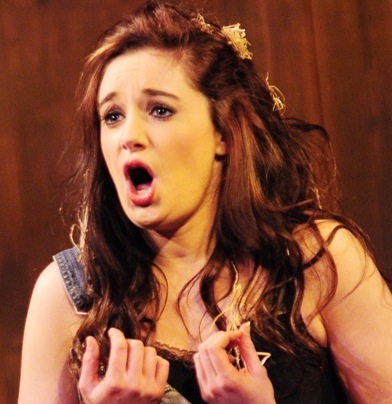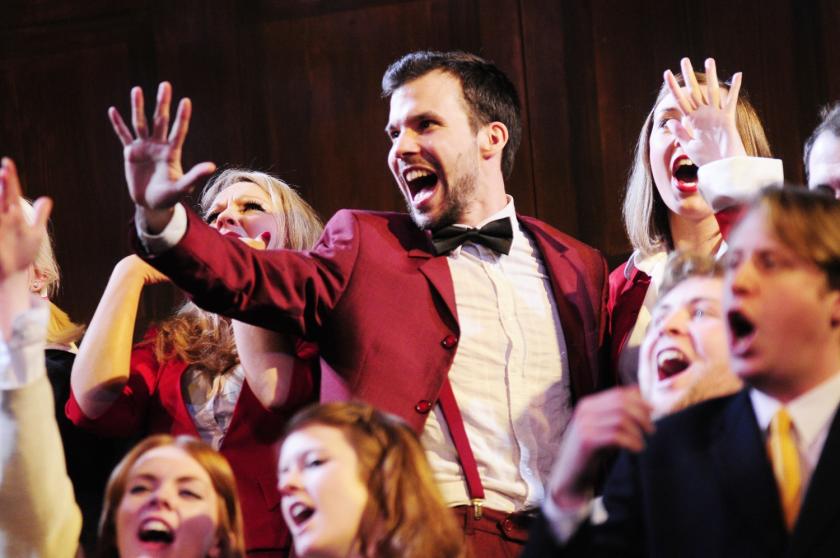Since I last reviewed Opera’r Ddraig (no longer offered as Dragon Opera in their publicity) two years ago, this company of students and postgraduates has moved house, and this year is staging its main show, Offenbach’s delightfully absurd Orpheus spoof, in the cavernous old Coal Exchange down by Cardiff Bay.
It isn’t a happy move, and I hope won’t be permanent. The Exchange is a high, flat hall with, of course, no orchestra pit, and the show’s director, Imogen Tedbury, has put up a steeply terraced stage which makes for excellent sight-lines but badly inhibits stage movement, entrances and exits, scene changes, and all the other amenities of the kind of proscenium theatre Offenbach wrote for.
The result is a somewhat inert, congested stage picture, in a work that, like most French operetta, needs speed and movement to disguise its dramatic vapidities. Admittedly Orpheus in the Underworld is a rather superior example of the genre. It soothes irritation at every turn with an exquisite melody or a satirical idea so witty that one quite forgets to find it ludicrous. And in the same way, there is so much that’s good about the performance of these young singers and players that one happily overlooks the problems the production and the venue impose on them.
 Outstanding in the first of the two casts is the Eurydice of the young Irish soprano Emma Nash (pictured right), still a student at Opera’r Ddraig’s parent establishment, the Royal Welsh College of Music and Drama. She has a lovely silvery quality, excellent control in the upper regions, good support lower down, and a vivid stage presence. In many ways she dominates the production, and thoroughly deserves her extra Act 2 couplets from the longer revised 1874 score, which gets a fairly generous outing altogether in this performance. Mercury’s saltarello is a specially welcome guest in the second scene, dispatched with terrific verve by Roland Harrad, who somehow manages to sing and chassé through the milling throng.
Outstanding in the first of the two casts is the Eurydice of the young Irish soprano Emma Nash (pictured right), still a student at Opera’r Ddraig’s parent establishment, the Royal Welsh College of Music and Drama. She has a lovely silvery quality, excellent control in the upper regions, good support lower down, and a vivid stage presence. In many ways she dominates the production, and thoroughly deserves her extra Act 2 couplets from the longer revised 1874 score, which gets a fairly generous outing altogether in this performance. Mercury’s saltarello is a specially welcome guest in the second scene, dispatched with terrific verve by Roland Harrad, who somehow manages to sing and chassé through the milling throng.
The rest of a large cast are never less than solid, often better than that. I particularly enjoyed Matthew Clark’s Boris Johnson lookalike Jupiter, his face lit by a sweetly helpless smile as his thunderbolts fail to go off; and Matthew Tilley’s superbly vulgar John Styx, pinching his own bottom as he reminisces about his kingship of Beotia. The big – perhaps too big – chorus sing and can-can with enthusiasm rather than huge discipline, but the orchestra under Calum Fraser is excellent by any measure, and Fraser himself catches the style of music that often eludes Anglo-Saxon conductors.
This is a show that generally maintains the high musical standards Opera’r Ddraig set themselves from the start. But they need to find a venue that enables production values on the same level. At the Coal Exchange they are crowded into a knife-edge, sauve qui peut style of making do and having a good time. For students that may be OK, but on the brink of the profession it doesn’t quite cut the mustard.















Add comment